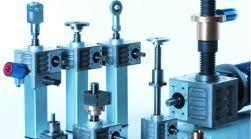In the dynamic world of material handling, efficiency reigns supreme. Here’s how mechanical screw jacks, these deceptively simple mechanisms, emerge as champions of efficient load handling across diverse applications.
The Power of Efficiency:
- Precise Control: Unlike hydraulic systems, screw jacks offer exceptional control over lifting and lowering speeds. This allows for smooth, controlled movement of loads, minimizing the risk of damage and ensuring precise positioning.
- Self-Locking Mechanisms: Certain screw jack types boast self-locking mechanisms. This eliminates the need for additional brakes, simplifying operation and preventing loads from drifting downwards after reaching their destination.
- Minimal Power Consumption: Compared to hydraulic systems, screw jacks generally require less power to operate. This translates to lower energy consumption and reduced operating costs.
- Reduced Maintenance Needs: The straightforward design of screw jacks minimizes maintenance requirements. Regular lubrication and basic inspections are often sufficient to keep them operating smoothly.
Optimizing Efficiency:
- Matching the Jack to the Job: Selecting a screw jack with a load capacity exceeding the weight you intend to handle is crucial. Overloading a jack reduces efficiency and increases wear and tear.
- Lubrication: Using proper lubricants specifically designed for screw jacks minimizes friction and optimizes efficiency. Regular lubrication is essential for maintaining peak performance.
- Anti-Backlash Mechanisms: For applications requiring high precision, consider screw jacks with anti-backlash mechanisms. These eliminate unwanted play in the system, ensuring precise and efficient load movement.
Applications for Efficient Load Handling:
- Manufacturing: Screw jacks streamline material handling within production lines, facilitating efficient lifting and maneuvering of components during assembly processes.
- Warehousing: These jacks can be integrated into pallet racking systems, enabling efficient loading and unloading of goods.
- Construction: Screw jacks assist in the efficient lifting and positioning of building materials like beams, panels, and prefabricated structures.
- Machine Tooling: They are employed in precise adjustments of machine tools and presses, ensuring optimal performance and efficient production processes.
Beyond Efficiency:
- Durability: Screw jacks are renowned for their robust construction, capable of withstanding demanding industrial environments and providing reliable performance for extended periods.
- Safety: The self-locking mechanisms of certain screw jack types enhance safety by preventing accidental load drops.
- Cost-Effectiveness: Compared to hydraulic systems, screw jacks offer a more cost-effective solution for many load handling applications. Their lower purchase price and reduced maintenance requirements contribute to overall cost efficiency.
Conclusion:
Jack screws transcend their role as simple lifting tools. Their ability to provide precise control, minimize energy consumption, and require minimal maintenance makes them champions of efficient load handling across various industries. By understanding their strengths and implementing optimization strategies, you can leverage the power of screw jacks to streamline your material handling operations, maximize efficiency, and achieve your productivity goals.






